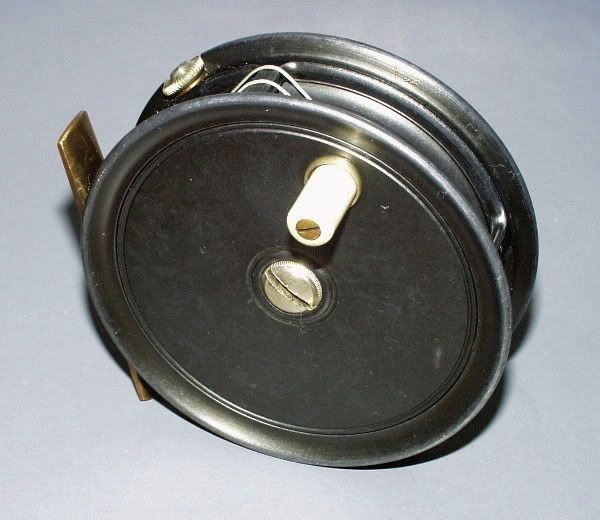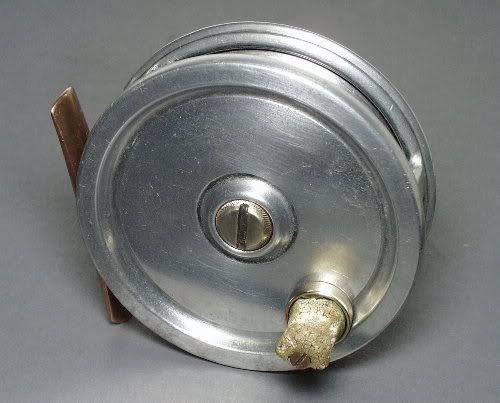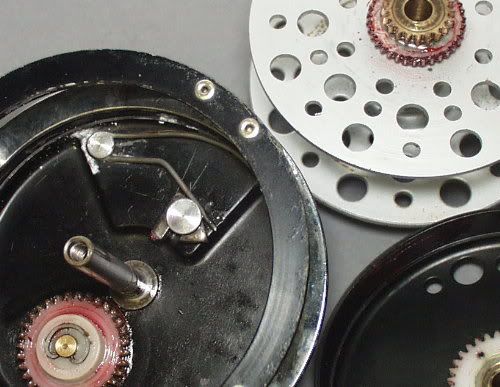I wanted to post specifically asking if the vinegar/water cleaning method is safe for plastics, including Bakelite and whatever other types of plastic might be used in a reel (like knobs and handles). Then I'm wondering if there are specific things people treat plastics on a reel with. I've learned, from working on special interest cars, not to use Armor-All on anything I care about. For vinyl (and actually all plastics and rubber) treatment on my car I use 303 Aerospace Protectant. I would imagine that most of the plastics encountered on a reel are rather different from those on a car, however.
Thanks!
Cleaning plastics
- Ron Mc
- Star Board Poster
- Posts: 3410
- Joined: Thu Apr 29, 2004 7:49 am
- Location: downtown Bulverde, Texas
- Contact:
have noticed that the vinegar mix turns hard rubber to a leathery color.
What is happening here is that surface photo-oxidation has released the carbon black pigment and the vinegar lets it wash away (the insides always stay perfectly black)
If its very shallow, you can polish it back to black. I've also found that a good wax will darken them some.
I also limit the vinegar/water bath times on rubber, lead-finished aluminum and painted reels. Usually not more than one hour, and sooner if it's clean.
Note that painted brass spits its paint in just about anything because copper evolves so much hydrogen gas (strong cathode).
Bakelite is no problem - thermosets are most resistant of all plastics. In organic extraction procedures to sort and identify unknown compounds, these are the last thing left after hexane, tetrahydrofuran and methylene chloride washes. So nothing hurts bakelite.
BTW, I sent you a pm in reply to yours. Also accidently blocked your e-mail on my home computer and now can't find it my spam folders.
What is happening here is that surface photo-oxidation has released the carbon black pigment and the vinegar lets it wash away (the insides always stay perfectly black)
If its very shallow, you can polish it back to black. I've also found that a good wax will darken them some.
I also limit the vinegar/water bath times on rubber, lead-finished aluminum and painted reels. Usually not more than one hour, and sooner if it's clean.
Note that painted brass spits its paint in just about anything because copper evolves so much hydrogen gas (strong cathode).
Bakelite is no problem - thermosets are most resistant of all plastics. In organic extraction procedures to sort and identify unknown compounds, these are the last thing left after hexane, tetrahydrofuran and methylene chloride washes. So nothing hurts bakelite.
BTW, I sent you a pm in reply to yours. Also accidently blocked your e-mail on my home computer and now can't find it my spam folders.
Ron, thanks for the explanation. What about plastics that would commonly be used for reel handles? There must be a bunch of different plastics used, but I read for instance that Pflueger used Pyralin for Medalist handles. And on the Winchester I cleaned last night, it didn't appear that I'd be able to remove the plastic knob before cleaning the crank, so I took a chance. It didn't seem to harm it at all.
- Ron Mc
- Star Board Poster
- Posts: 3410
- Joined: Thu Apr 29, 2004 7:49 am
- Location: downtown Bulverde, Texas
- Contact:
some of the handle compounds will swell when you put them in any water.
I've noticed on my UK reels that crazed "ernoid" handles are awful about that, while the same compound on a handle that is still smooth doesn't care if you put it in water.
I believe naptha in old UK lubes started breakdown of the polymer. Once the damage is done the handles swell whether you put them in water or in vinegar solution - doesn't matter.
Every reel of mine that you have seen has been cleaned using the vinegar solution.
here's some others:
http://www.stream-fisher.com/bamboofish ... c.php?t=25
I've noticed on my UK reels that crazed "ernoid" handles are awful about that, while the same compound on a handle that is still smooth doesn't care if you put it in water.
I believe naptha in old UK lubes started breakdown of the polymer. Once the damage is done the handles swell whether you put them in water or in vinegar solution - doesn't matter.
Every reel of mine that you have seen has been cleaned using the vinegar solution.
here's some others:
http://www.stream-fisher.com/bamboofish ... c.php?t=25
Err, interesting choice of material for a product that gets used around water . . .Ron Mc wrote:some of the handle compounds will swell when you put them in any water.
Ron, totally off-topic here, but I see you're a metallurgist. I don't know if you're familiar with the recent book by Darrell Martin, The Fly-Fisher's Craft. It delves deeply into the history of fly fishing and in particular goes into aspects of tacklemaking that were once done by the angler himself. One is hookmaking (others are furled horsehair lines and wooden loop rods). Martin says that good quality fishhook wire is hard to come by, and that it needs to be high carbon. Coincidentally, around the same time I was reading this, I had need for some piano wire, which I found is high-carbon wire, and blessedly comes in quite a range of gauges. Do you see any reason why piano wire couldn't work for making fishhooks? (After sharpening, barbing, and bending, the wire gets heated to red, quenched in water, then heated to blue-purple.) It looks like a fun thing to try, but I don't want to doom my effort with the wrong material.
- Ron Mc
- Star Board Poster
- Posts: 3410
- Joined: Thu Apr 29, 2004 7:49 am
- Location: downtown Bulverde, Texas
- Contact:
they don't start swelling in water until they start decomposing because of the naptha in the old lube.

pristine ernoid,
so hard, bright and shiny, its hard to photograph
 crazed, swollen and falling apart
crazed, swollen and falling apart
solvents are the scary thing with plastic handles. I've heard of people trying to strip old Medalists for repainting and making their handles soggy in acetone.
piano wire would make great fish hooks. I use it all the time to make springs. I have high-nickel alloy piano sitting around the shop and can find pieces in just about any size I need - 200-year springs - or fish hooks.


pristine ernoid,
so hard, bright and shiny, its hard to photograph
 crazed, swollen and falling apart
crazed, swollen and falling apartsolvents are the scary thing with plastic handles. I've heard of people trying to strip old Medalists for repainting and making their handles soggy in acetone.
piano wire would make great fish hooks. I use it all the time to make springs. I have high-nickel alloy piano sitting around the shop and can find pieces in just about any size I need - 200-year springs - or fish hooks.

